Carbon accounting drives emissions reduction
Reducing carbon emissions is crucial for the water sector's long-term sustainability, and a standardised approach to measuring, monitoring and mitigating emissions is not only desirable, but vital.
UKWIR has been instrumental in developing tools to combat climate change, with the Carbon Accounting Workbook (CAW) being a key initiative. It now plays a significant role in supporting the water sector address the climate crisis and is used as the base to report against Ofwat’s new Carbon Performance Commitments.
The challenge
The water sector is both impacted by climate change and - as a major energy user and carbon emitter – contributes to it. Water companies and suppliers are becoming increasingly conscious of their carbon footprints, driving growing ambition for emissions reduction.
However, organisations cannot effectively manage what they cannot measure. In the mid-2000s, there were no universally accepted methodologies for carbon accounting in the water sector, hindering comparisons.
Standardised approach
In 2005, UKWIR developed the CAW in partnership with experts from the water sector and academia, to provide a standardised approach for measuring, monitoring, and managing operational carbon emissions. The CAW offered a consistent framework for carbon measurement, enabling water companies to identify and quantify their environmental impact for the first time.
The CAW is now the standard framework used for annual reporting and, in future, will be used to report on Ofwat's new Carbon Performance Commitments.
Evolution of the workbook
The UKWIR Carbon Accounting Workbook has undergone annual revisions to reflect evolving best practices and regulatory requirements.
These updates ensure that water companies remain up-to-date with the most relevant emission factors and can track progress, compare emissions, and set benchmarks.
UKWIR's collaborative approach means each CAW version is responsive to changing legislative and regulatory drivers.
Informed decision-making
The CAW is now a vital tool for the water sector, enabling companies to demonstrate their environmental commitment to reducing greenhouse gas (GHG) emissions.
As well as helping water companies understand their carbon footprint, the workbook is instrumental in supporting informed decisions around resource management, infrastructure investment and energy balancing.
The water sector is both impacted by and contributes to climate change. Understanding their carbon footprint using the CAW enables water companies to invest in sustainable technologies and infrastructure that minimises environmental impact.
Future expansion of CAW scope
UKWIR is currently developing a next-generation Carbon Accounting Workbook.
The ambition is not to just update the current CAW but develop a ‘next generation’ GHG estimation and reporting tool which will enable companies to easily report their GHG emissions.
On top of the necessary ability to accurately report and model companies’ emissions, the re-designed tool will be easier to use and adaptable to improvements made in carbon reporting and monitoring methodologies. To support this, visibility of calculations and models in the tool will be improved to aid data assurance.
Strategy alignment
The Carbon Accounting Workbook aligns with the UKWIR Research Strategy and UN Sustainable Development Goals (SDGs).
It helps water companies measure their environmental impact, contributing to evidence-based solutions and addressing UKWIR's 5th Research Theme: Achieving net zero carbon. It also supports SDG 13: Climate Action and SDG 17: Partnerships through its collaborative development and implementation.
"UKWIR's work is essential for water companies to achieve their carbon reduction commitments and mitigate the impacts of climate change. Remaining resilient in a changing climate is a significant challenge. Identifying climate-related risks is crucial for adaptation efforts."
Dan Green, UKWIR programme lead
Empowering the water sector
The Carbon Accounting Workbook empowers the water sector to understand its environmental impact, identify areas for improvement, and develop effective sustainability strategies.
In addition, standardised data enhances transparency, attracts investors, and fuels innovation in cleaner technologies.
The workbook, along with other carbon-focused research projects, is instrumental in driving positive change within the UK water sector. By providing a framework, the workbook has fostered transparency, enabled informed decision-making, and empowered companies to tackle the climate crisis.
As it continues to evolve, the workbook will remain a vital tool for the water sector in its journey towards a more sustainable future.
To find out more about the Carbon Accounting Working click here
